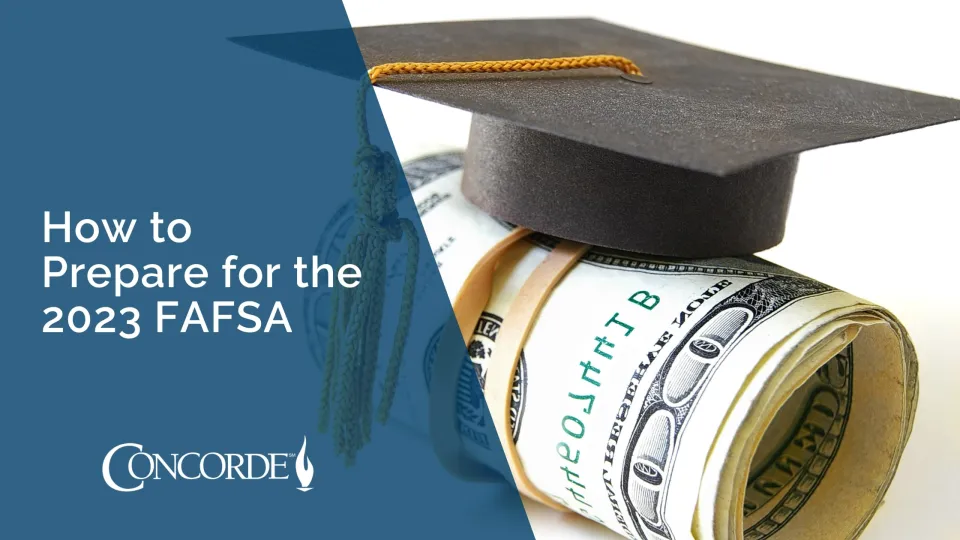
The Free Application for Federal Student Aid, or FAFSA, is a form you can complete to learn more about what types of financial assistance you can receive from the government when paying for school. Each year, there are minor changes to the FAFSA that can affect the aid you receive and the process you follow to submit the application. If you're attending or planning to attend Concorde to start your career training, the FAFSA is a vital step in the process that you don't want to miss. Here's everything you need to know about the 2023 FAFSA.
Preparing for the 2023 FAFSA
If you're planning to pursue higher education in 2023, learning more about your financial aid options (1) can help you lower costs and start your career with little to no help minimize your student loan debt.
About the FAFSA
The FAFSA is an important part of your higher education journey. It helps you better understand your financial situation and what kinds of financial support may be available to benefit you. Students complete the FAFSA every year and provide information about taxes and income. Whether you supply information about your own income or your guardians' income depends on how old you are and if you qualify as a dependent.
Why Complete the FAFSA?
Completing the FAFSA grants you access to many types of financial aid. Besides qualifying for loans, grants, and work-study positions, completing the FAFSA may be necessary for other private scholarships or those through the school. These are some reasons to complete the FAFSA this year:
- Convenience: The FAFSA is an easy process to complete. It can take even less time when you're prepared.
- Scholarships: Some private scholarships may require that you complete the FAFSA to be eligible.
- Loan savings: Completing the FAFSA grants you access to government loans, which often have much lower interest rates than private options.
Have Important Documents on Hand
Before you begin filling out your FAFSA, it is a good idea to gather your documents. This minimizes the amount of time the process can take and may reduce your FAFSA-related stress. These are some of the important documents and pieces of information you should have on hand when you complete the FAFSA:
- Your social security number and/or alien registration number: The form uses this information to verify your identity.
- Income tax returns and W-2 forms: Tax and income information helps the government determine what level of aid you require.
- Records of investments and bank statements: Those with substantial investments and savings may receive less aid than those without.
- Documents showing untaxed income: The FAFSA wants to account for all forms of income.
- IRS Data Retrieval login and FSA ID login information: It may take some time to recover your account information, so ensuring your know your log-in can reduce the FAFSA time.
Your FAFSA Login Information
Your FAFSA login is the information used to gain access to your profile on the site. To log in, you need your Federal Student Aid (FSA) ID username and password. This profile contains information about your current progress and previous FAFSA applications. It's important to note that you can complete the FAFSA without an FSA ID if you don't plan to submit the form electronically. You can print, sign, and mail a physical copy of your FAFSA if you don't want to complete it online.
Who Can Complete the FAFSA?
How you login to the Federal Student Aid website depends on who you are. Multiple people can gain access to the same profile and FAFSA information. These are some of the different users (2) that can complete the FAFSA:
- Student: To log in as a student, you can enter your FSA ID or use identifiers if you're from a Freely Associated State.
- Preparer: A preparer is someone who completes the FAFSA on behalf of the student. Preparers are often professionals you pay for assistance with the process.
- Guardian: Guardians may log in and complete the FAFSA on behalf of their student.
Your 2022 FAFSA Login Information
If you completed the FAFSA for the 2022 school year, you can use the same login for 2023. If both you and your guardians have FSA IDs, they must be different usernames and passwords. This is the same in 2023, and your guardians can use their FSA IDs to log in and complete an electronic signature. If you don't remember your FSA ID, you can recover the information.
To recover your FSA ID information, you can choose the "Forgot Username" option on the site to create a new one. If your account has a verified email or phone number, this can be the quickest way to recover your information. Similarly, if you forgot your password, you can choose the "Forgot Password" option to create a new one. If you created an FSA ID as a student, you can use the same one as a parent.
Knowing Your School Code
The school code is an important part of the FAFSA process and helps you ensure you're delivering your information to the correct institutions.
What Is a School Code?
A federal school code (3) is a series of numbers and letters that the Federal Student Aid organization assigns to every college. The code for each school is unique and serves as an identifier for that institution. You can recognize a school code by knowing that it always has six characters and starts with a B, E, G, or the number 0. For example, Concorde's school code is 015510.
How To Find Your School Code
To find your school code, you can use the Federal School Code search tool on the Student Aid website. You can also use a search engine and type the name of the school and "Federal School Code," which usually provides you with the information you need. Before submitting your FAFSA, double-check the school code you input. It's important that the code is correct so the school receives your financial information and can confirm your eligibility for financial assistance.
Independent vs. Dependent
Besides knowing your FSA ID and having your documents ready, it's also important to know if you're an independent or dependent filer. It can be confusing to understand this while completing the FAFSA, but there are some simple questions you can ask to help you determine your dependency status (4).
What Is Dependency Status?
Dependency status signals whether you're responsible for supporting yourself or whether someone else may be helping you pay for your education. The FAFSA qualifies dependency differently than other institutions, and may not rely solely on your tax filing information. Federal student aid programs assume that it's your family's responsibility to fund your education, and also assume that you have your parents' support in doing so.
Why Is Dependency Status Important?
Your dependency status is important because it determines how you fill out the FAFSA and what you may qualify for in terms of aid. If you're a dependent student, you provide information about both your and your parent's income. Independent students, however, only provide information about their own income. If you're an independent student, you also report information about your spouse's income, if you're married.
How To Determine Your Dependency Status
It can be confusing to understand your dependency status, but there are several ways you can determine if you're an independent or dependent student. The FAFSA itself includes questions that determine your dependency status. If you answer "yes" to any of the following questions, you're an independent student:
- Will you be 24 years old or older by January 1, 2023? (Were you born before January 1, 2000?)
- Are you married? (Or separated but not divorced.)
- Will you pursue a doctorate or master's degree?
- Do you have children or dependents who receive more than half of their support from you?
- Are you currently serving in the U.S. armed forces or a veteran?
- When you turned 13, were you in foster care, a ward of the court, or a child to deceased parents?
- Are you an emancipated minor, homeless, or at risk of being homeless?
Reporting Parent Information
If you determine that you're an independent student, you may be confused about which parent's financial information you should supply. If your parents are married, or not married and living together, you can provide income information about both of them. If your parents are divorced, you can supply information about the parent you lived with during most of the previous 12 months.
Important 2023 FAFSA Deadlines
Knowing important dates for the 2023 FAFSA can help you ensure you turn in the form and get the financial assistance you need for school. Missing a deadline may mean you don't get to take full advantage of the financing options available to you. To learn more about your state or college deadlines, be sure to check with the local office or institution's financial aid department. These are some important deadlines and dates for the 2023 FAFSA:
October 1, 2022
This is the first day that the FAFSA form for the 2023-2024 school year becomes available. It's important to complete the FAFSA as soon as possible because many scholarships and grants are available on a first-come, first-serve basis. Consider completing the FAFSA on opening day to maximize your chances of receiving more financial aid.
June 30, 2023
The deadline for the final day to submit the FAFSA for the 2023-2024 school year is June 30, 2023. Though it's best to submit the FAFSA as soon as possible, you can wait until the summer before the school year to do so. Be sure to keep this date in mind and submit your application before midnight to be eligible for federal aid.
September 9, 2023
Though June is the deadline for submitting your FAFSA, you can still submit corrections and updates through September. This is helpful if you realize you made a mistake on your form or need to change any information. Check with your college to determine when the deadlines are for corrections according to institution policies.
Types of FAFSA Aid
If you don't qualify for Federal Student Aid, you can also apply for additional scholarships (5). These are some of the different types of FAFSA aid you may receive, depending on your eligibility:
Loans
There are two types of loans you can be eligible for when you complete the FAFSA, subsidized and unsubsidized. The loans you gain access to through the FAFSA often have better interest rates than those you can take out privately. A subsidized loan is one that doesn't have any interest, and an unsubsidized loan from the government is usually a low-interest loan you can use to pay for tuition, housing, and supplies.
Work-Study
Work-study programs allow you to exchange your time for money you can use to pay for school. Institutions often have certain positions that are available for work-study only, so completing the FAFSA can help you gain access to limited jobs. Some work-study positions pay you, while others apply your earnings directly to your bill.
Grants
A grant is a sum of money that you don't have to pay back. If you qualify, you can receive a Pell Grant from the government that can help you pay for a substantial amount of your tuition. You can also use grants to pay for supplies like textbooks, laptops, and course programs.
2023 FAFSA Changes
These are some changes you may notice between the 2022 and 2023 FAFSA:
- The myStudent Aid app is now retired.
- Drug conviction eligibility questions are removed.
- Selective Service questions are removed.
- The maximum number of questions is reduced.
- Pell Grant information is more readily available.
Staying Updated on FAFSA Changes
When the FAFSA changes, it's important to learn about the changes so you can ensure you complete the form correctly and receive the full amount of aid for which you're eligible. These are some ways you can stay updated on FAFSA changes:
- FAFSA Instagram: @federalstudentaid
- FAFSA Twitter: @FAFSA
We hope this guide has been helpful if you're pursuing higher education in 2023. From nursing to patient care, Concorde has offers the education you need to start pursue your career. If you're interested in preparing for a health care career in months instead of years, learn more about Concorde and explore our list of programs.
Footnotes
"Financial Aid" Concorde, https://www.concorde.edu/admissions/financial-aid
"Log-in Options" Federal Student Aid, an Office of the U.S. Department of Education, https://studentaid.gov/help/log-in-options
"What is a Federal School Code?" Federal Student Aid, an Office of the U.S. Department of Education, https://studentaid.gov/help/federal-school-code
"For purposes of applying for federal student aid, what's the difference between a dependent student and an independent student?" Federal Student Aid, an Office of the U.S. Department of Education, https://studentaid.gov/apply-for-aid/fafsa/filling-out/dependency
"Student & Alumni Scholarships", Concorde, https://www.concorde.edu/admissions/scholarships
Take The Next Step Towards a Brighter Future
We have a Concorde representative ready to talk about what matters most to you. Get answers about start dates, curriculum, financial aid, scholarships and more!




